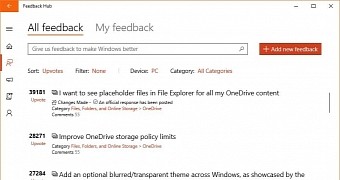Before coming under fire for leaving consumers behind for enterprises, Microsoft has often been criticized for not listening to users despite the company’s commitment to working together with them on improving products like Windows and Office.
The Windows Insider program, started in October 2014, was the first big proof that the software giant was aiming for stronger ties with the Windows community, as it allowed users to try out major Windows 10 updates before the public launch.
The idea was pretty simple: members of the Windows Insider program were supposed to install early Windows 10 builds, provide feedback and suggestions which Microsoft then used for the final product.
With feedback among the most valuable things when building new products, Microsoft transformed the Windows Insider program into a world of its own. Dedicated events, multiple rings, apps and updates that are developed with help from users across the globe, all of them have seen daylight in the last few years.
But this hasn’t stopped some people from criticizing the company for ignoring their feedback. And truth be told, not all the suggestions have been implemented in Windows 10, despite some of them actually making a lot of sense.
And yet, as anyone can see by simply launching the Feedback Hub, the most popular submissions there are already part of Microsoft’s product portfolio. These top-rated feedback entries have nearly 150,000 votes from users worldwide and all of them have already been developed by Microsoft. Is this the living proof that Microsoft is listening to feedback? I’d say it is, though this doesn’t necessarily mean that Microsoft still doesn’t need to focus even more on its relationship with users worldwide.
The number one suggestion calls for Microsoft to bring back placeholders in File Explorer for OneDrive accounts. This feature is now part of Windows 10 as Files On-Demand and is available not only for insiders, but for production devices as well.
“Feedback is the most valuable asset for a software developer.”
Then, it’s the OneDrive storage policy limits, which according to more than 28,000 voters, should be further improved. Microsoft has given several touches to OneDrive lately in an attempt to make its cloud platform a better rival to the likes of Google Drive, though the default amount of free storage space is still at 5GB. For comparison, Google Drive offers 15GB to new users.
OneDrive, however, is a key part of Microsoft’s long-term strategy, and at the same time, it’s also an essential service integrated into Windows 10, Outlook, and Office.
The third most-voted submission is a blurred/transparent theme across Windows. As you might have heard, Microsoft is working on a major overhaul of Windows 10 with a new design language called Fluent Design System. This has evolved a lot lately, and the April 2018 Update brings acrylic and other effects in more areas of the OS, with the upcoming Redstone 5 due in the fall to continue this visual facelift too.
The fourth entry concerns Microsoft Edge, which according to users was very slow and sometimes crashed. The default Windows 10 browser has also evolved substantially with the latest Windows 10 updates, and while it still doesn’t offer the functionality of Google Chrome or Mozilla Firefox, it’s definitely a stable and reliable choice. Much more than it was back in its first days on the market. I’ve rarely experienced any crashes in Microsoft Edge, even though, again, some features are still missing versus its rivals.
And last but not least, the fifth most voted feedback entry demands tabs in File Explorer. Microsoft’s isn’t just bringing tabs to File Explorer, but to the entire operating system. This is possible with a feature called Sets, currently available in preview in Redstone 5 builds, but likely to go live to everyone in the coming updates.
If we’re judging only from these feedback requests, it looks like Microsoft is indeed listening to customers, even though sometimes it doesn’t happen exactly as we expect and features arrive rather later than sooner. But in the end, this is a sign that Microsoft is not all about the enterprise, and in the long-term, this can be only good news for everyone.

 14 DAY TRIAL //
14 DAY TRIAL //